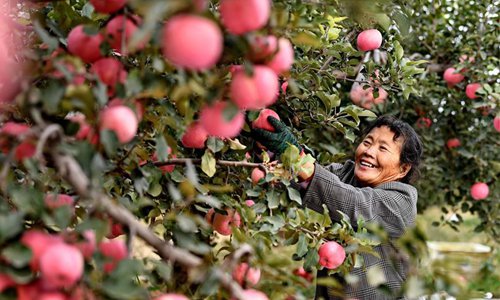HOME >> BUSINESS
Futures trading boosts Chinese apple prices
By Xie Jun Source:Global Times Published: 2019/6/9 22:28:40

A villager harvests apple in Nanhaibin Village, Laoting County, north China's Hebei Province, Oct. 22, 2018. In recent years, the local government takes great effort to develop fruit and vegetable industries, which has boosted economy and increased farmers' incomes. (Photo: Xinhua)
Normally, few Chinese families would hesitate to buy apples due to cost. But now, some might think twice before spending on the fruit as apple prices have soared.
Statistics from agri.cn, which lists the wholesale price of China's agricultural products, shows that apples were sold for 12.8 yuan ($1.85) per kilogram (wholesale price) on average in the week ending Saturday.
That means the price of apples has more than doubled in just one year's time in China, as from June 2 to June 8, 2018, the average wholesale price for dometsic apples was only 5.32 yuan per kilogram, also according to the agri.cn statistics.
Some domestic media reports have attributed the soaring prices to active trading of apple futures, as some apple dealers have tried to maximize their profits by combining spot transactions and dealing in futures for apple sales.
In particular, some domestic apple dealers have been stocking apples for apple futures delivery. "Half-hour Economy", a program of state-owned broadcaster China Central Television, in a recent report cited a representative from an apple vendor in Northwest China's Gansu Province, who said that the company's income had doubled this year after it dabbled in this sales model combining futures trading and spot transactions.
Another interviewee said one of his acquaintances had earned 1.7 million yuan in apple futures trading with just 70,000 yuan as principal in 2018, also according to the report.
Jiao Shanwei, editor-in-chief of cngrain.com, a website specializing in grain news, stressed that speculation in apple futures climaxed in 2018, following an abrupt drop in appleproductionbecause of the cold weather last spring that damaged apple blossoms. According to him, this supply shortage has continued into this year.
However, he mentioned that due to management by government regulators to rein in such activity, apple futures speculation has largely eased this year, and the price fluctuation of apple futures has tended toward a normal state this year.
The apple futures AP1907 (delivered in July 2019) saw its price soar by 13.78 percent in May and 7.11 percent in April, while AP1911 also saw its price surge by 17.42 percent in May.
However, both futures saw their pricesfall in June, with AP1907 dipping 1.76 percent as of Thursday, while AP1911 has seen a price plunge of 6.98 percent so far in June.
"Currently, the most fundamental reason behindthe apple prices is still the imbalance between apple supply and demand, as apple stock and supply are still low compared with the huge demand on the market," Jiao said.
He also noted that as there is some linkage between futures price and spot transaction price, the rise in apple futures prices would also act as a boost to the sales price of apples, but this influence is just auxiliary. "Besides, the government sometimes intervenes in the price of fruit in the form of macroeconomic control, so futures price fluctuation would not be the core impetus behind the price rise," Jiao explained.
Posted in: INDUSTRIES,BIZ FOCUS